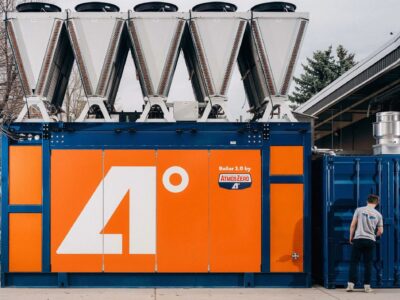Eggs for beer. That’s what started it all. In the late 2000s, Conor Robinson delved into the world of beer homebrewing as a hobbyist. His good friends, Chris and Tara Goulet had a hobby of their own: keeping chickens for the farm fresh eggs. Naturally, a quid pro quo of eggs-for-beer ensued, and an idea was hatched.
Chris Goulet was working a corporate job in 2010 but was looking for an outlet for his passions. Tara, a manager at the same bakery where Robinson worked, and not a stranger to the small business world, wanted a break from her role too. Conor Robinson was her colleague, and he also found himself seeking change. They decided there could be a brainchild at the center of all their respective desires: a local craft brewery — a watering hole for people to call home. Fast forward 11 years and Birdsong Brewing is one of Charlotte, North Carolina’s premier breweries.
“It was just meant to be a side gig,” said Chris in a short video documentary about the company that they published on their site, “we just opened [Birdsong] as a hobby.” Despite just being a pastime, Chris worked tirelessly on developing a fleshed-out business plan.
Then, he says, he pitched the idea to Conor Robinson of being the head brewer. Quickly, the plan became a reality.
“Conor’s philosophy is way more focused on balance,” Chris said, “so he is going to come out with a beer that is delicious…but doesn’t like, punch you in the face,” he says with a chuckle. “It’s not trying to be over the top and gimmicky.”
The small team’s efforts took off, though. Conor’s passion for unique beers, Tara’s skillset with small business growth and management, and Chris’s knack for the corporate world and business operations all combined to brew something fabulous.
The company began its unfiltered, craft beer production as draft-only in 2011, and within about 3 years, they needed to expand. Originally in a warehouse space with 4,500 square feet, the three-person team’s business was now demanding more, and they moved to a plot down the road over three times the size, at a whopping 17,000 square feet.
Intertwined in their growth has consistently been a thread of sustainability, and a passion for corporate responsibility. “We realized that we could use less water through side streaming” in the brewing process, said Goulet, and most notably, using solar panels on the roof of the building, which Birdsong owns. They have 220 panels on the roof for a 70-kilowatt system, letting the facility harvest about 40% of all of its energy needs. The renewable energy investment saves them about a thousand dollars each month on conventional power bills, and they receive tax credits.
“I’ve always been really focused on energy sustainability,” Chris said. On one of those outstanding North Carolina days with an abundance of sun, the excess energy is put back on the grid for regional utility supplier Duke Energy, and Birdsong is compensated.
North Carolina is ranked third in America for solar energy — a major step in reducing greenhouse gas emissions. “We’re not saving the world, but we can set an example,” Chris Goulet said to local news station WSPA.
By 2014, Birdsong Brewing was seeing huge jumps in production and sales year after year, sometimes exceeding 50% margins. Goulet says the growth is largely driven by their expansion into canning (from what originally was an all-draft operation), and partnership with local grocery chains to expand their customer base.
Birdsong may have started as a hobby, a side hustle, or a passion project. Since then, however, it has grown into something more – an example of an American small business embracing the future of renewables and the role of environmentalism in a local business.
“We try to make Birdsong an example of how you can focus on sustainability but still grow a business,” Chris said, later adding, “and, make it fun.”





